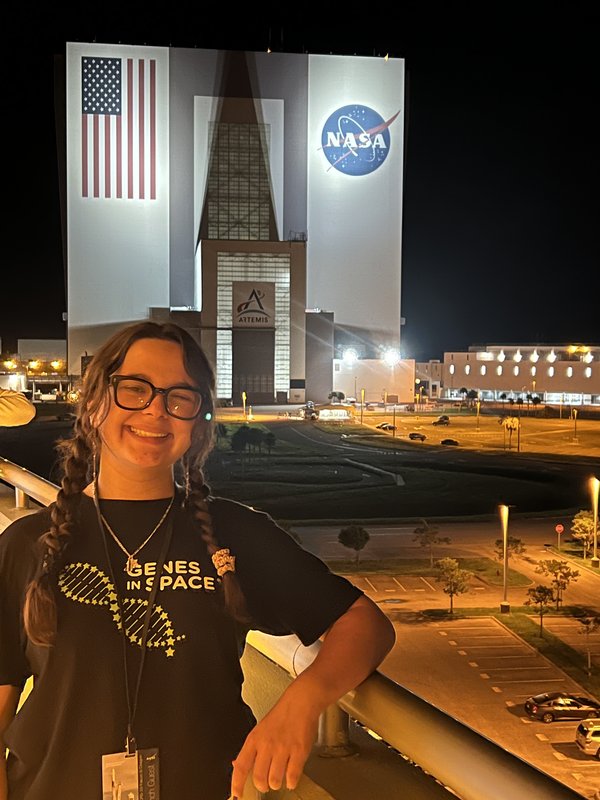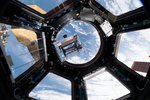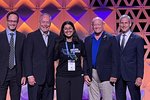Genes in Space 2024 student experiment successfully launched to the International Space Station
KENNEDY SPACE CENTER, FL – An experiment by Genes in Space 2024 contest winners Julia Gross and Isabelle Chuang launched on August 23, 2025 to the International Space Station aboard the SpX-33 resupply mission. Gross and Chuang, then high school seniors, won the competition by proposing the use of cell-free systems to synthesize bacteriophages in space and test their ability to lyse susceptible bacteria, with the ultimate goal of using phage therapy to treat bacterial infections.
Gross and Chuang’s research project on the International Space Station will have two components. First, the BioBits™ cell-free system will be used to produce bacteriophage components in orbit. Second, a fluorescence-based assay will aim to detect bacterial lysis indicative of cell death. Both student-designed experiments will rely on fluorescence visualization by an astronaut using the Genes in Space Fluorescence Viewer, a compact and easy-to-operate tool for rapid molecular detection.
“I think that this time last year, or slightly before it, when Isabel and I were first going to the Genes in Space finals, we didn't really think that this was the outcome that would occur. And it's just evidence of perseverance and science's ability to change. Our experiment is not what it was originally, but it is still super exciting and impactful. Being able to see it launch is a really cool opportunity that isn't common and can't be found anywhere else, so we're both super honored.”

Genes in Space-12 winner, Julia Gross, attends the launch of her experiment to the International Space Station
Julia Gross and Isabelle Chuang won Genes in Space as students at the Nightingale-Bamford School in New York City. Gross and Chuang designed their experiment with input from their academic sponsor, Mary Beth Spina, and their Genes in Space mentor, Harvard University scientist Dr. Kayleigh Ingersoll Omdahl. As they enroll in college this fall, both plan to continue their study of biology: Gross at Amherst College and Chuang at the Massachusetts Institute of Technology.
Gross and Chuang’s experiment will build on advances made by previous winners of the Genes in Space contest, including the first use of cell-free technology in space. Genes in Space was founded in 2015 by miniPCR bio and Boeing, with additional support from the ISS U.S. National Laboratory and New England Biolabs.
Media contact: Kristin Hennessy-McDonald, genesinspace@minipcr.com, 781-990-8727
About Genes in Space
Genes in Space™ is a national STEM contest that challenges students in grades 7 through 12 to design biotechnology experiments for space. Winning experiments are performed by leveraging the International Space Station (ISS) National Laboratory®, a platform for cutting-edge research and technology development that enables future space exploration. Genes in Space™ accepts applications between January and April each year. The contest is a collaboration between miniPCR bio™ and ISS prime contractor Boeing, with generous support from the ISS National Lab and New England Biolabs®. To learn more visit genesinspace.org


